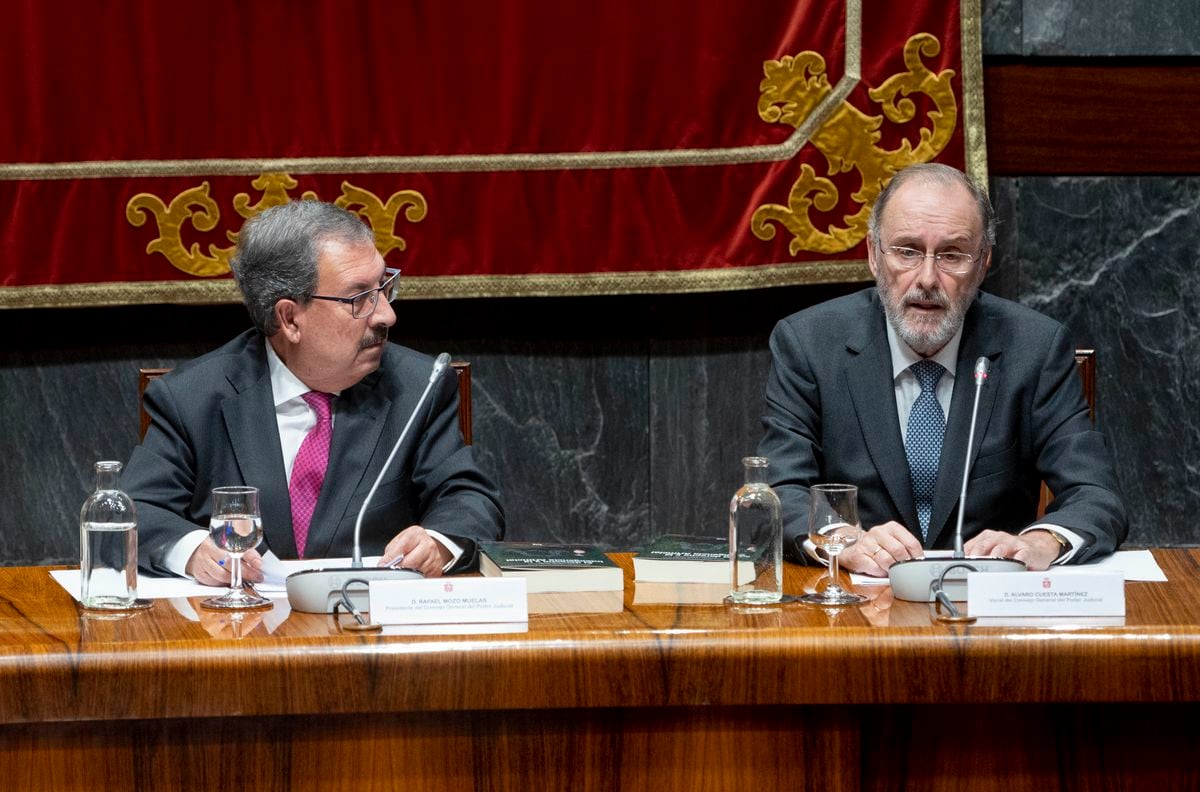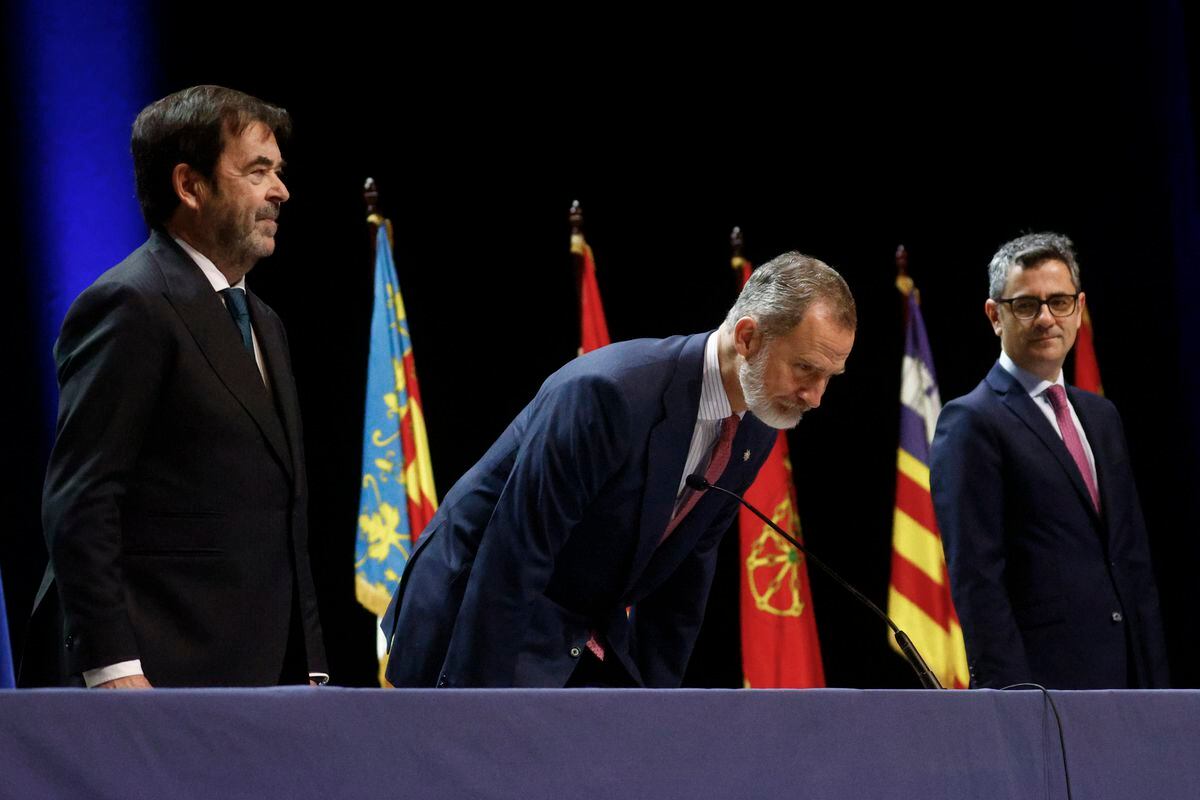There will be no en bloc resignation of the progressive members of the General Council of the Judiciary (CGPJ).
The six councilors proposed by the PSOE (Rafael Mozo, Álvaro Cuesta, Clara Martínez de Careaga, Roser Bach, Pilar Sepúlveda and Mar Cabrejas) and the one proposed by the PNV (Enrique Lucas) have ruled out a coordinated resignation on Tuesday to try to hasten the renewal of the governing body of judges, blocked since December 2018 due to the PP's refusal to reach an agreement with the PSOE.
The meeting of these members held at the headquarters of the CGPJ has also been attended by the member proposed by IU, Concepción Sáez, who does maintain the intention to resign, which she communicated by letter on the 13th. This resignation is what has led the rest to consider the possibility of a chain reaction.
The progressives raised the meeting this afternoon to discuss whether it was convenient for the entire bloc to follow in the footsteps of Sáez.
But before the meeting began, most assumed that the answer would be no.
"With the resignation you only get the conservative sector to celebrate it," admitted a progressive councilor in the hours prior to that appointment.
According to consulted sources of the organ, only the member Álvaro Cuesta has maintained during the meeting this afternoon the convenience of a collective exit.
It was he who, on Thursday, hours after Sáez's resignation became known, raised the possibility of resigning all at once to the rest of the group to provoke a kind of movement from within the CGPJ to the outside that would lead to the renewal of the body .
But after listening to the opinions against his colleagues, Cuesta has reserved his final decision (whether he stays with the rest of the progressive bloc or leaves individually as Sáez has done) and will communicate it in the coming days.
Most of the members consulted said they were open to resigning if it was shown that this step would lead to the collapse of the body and would cause the PP to have no choice but to accept the renewal to avoid chaos in the Judiciary.
But they are convinced that his resignation would only imply absolute control of the Council by the conservative members for many months, perhaps more than a year, when there is a new government after the next general elections.
Currently, the Council is made up of 10 conservative members and 8 progressives (which will be 7 when the announced resignation of Sáez materializes).
Just as the law says that the constitution of the plenary session requires a minimum quorum of 10 members plus the president —which would lead to paralysis if the 8 progressives resign—, the law does not specify any minimum quorum for the permanent commission, the highest body of decision after plenary.
This commission is made up of seven members (in its current composition, four conservatives and three progressives), so the hypothetical resignation of the minority block directors would not imply, initially, paralyzing the permanent one, in which they take the most of the decisions that affect the day-to-day judicial career, such as permits or licences.
However, there are many decisions that, after being taken by the permanent body, have to be ratified by the plenary and others that are the responsibility of this body alone, such as the approval of the reports on draft laws, the approval of the budget or the resolution of the disciplinary proceedings with more serious sanctions.
"Something would be noticeable, but it was not going to be chaos or force renewal," says a progressive member.
Some directors claim to feel uncomfortable by the fact that, after the resignation of Sáez, the focus has been placed on the rest of the members of this group in the hope that they can follow the path of the director proposed by IU.
“The renewal of the body is the responsibility of Congress and the Senate.
Their presidents are the ones who would have to call to promote it, ”says a member, who, like others in his group, reproaches his colleague Cuesta for having opened the debate without consulting the rest.
“Doing this in public is nonsense.
Either you go individually or you call a discreet meeting to discuss it,” admits a counselor.
Some have been surprised by both the forms and the substance: “That the resignation of Sáez, who had already announced his intention on some occasion, and has always had a very unique and different profile within the bloc,
In the meeting on Tuesday, the progressive members opposed to the collective resignation have not reproached Sáez for his resignation, but they have told him that they assume it as a personal decision that does not challenge them, sources from the body point out.
The member has decided to leave and this has been reiterated on Monday to the substitute president, the progressive Rafael Mozo, who hours before the meeting of the entire group has asked her if she was sure of his resignation.
Sáez, who has already emptied his Council office and is finalizing the logistical and bureaucratic procedures to formalize his departure, has replied that he did and that there is no possible way back from his decision.
Subscribe to continue reading
Read without limits
Keep reading
I'm already a subscriber


/cloudfront-eu-central-1.images.arcpublishing.com/prisa/3GRMM6OV45ND3OEGLDRTEXKOVU.jpg)





/cloudfront-eu-central-1.images.arcpublishing.com/prisa/EFER4KB5JTTXGTF22KCOC4AECY.jpg)
